Eid ul Fitr 2023 Holidays in Dubai: Ultimate Guide
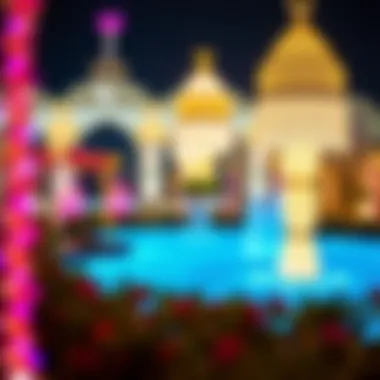
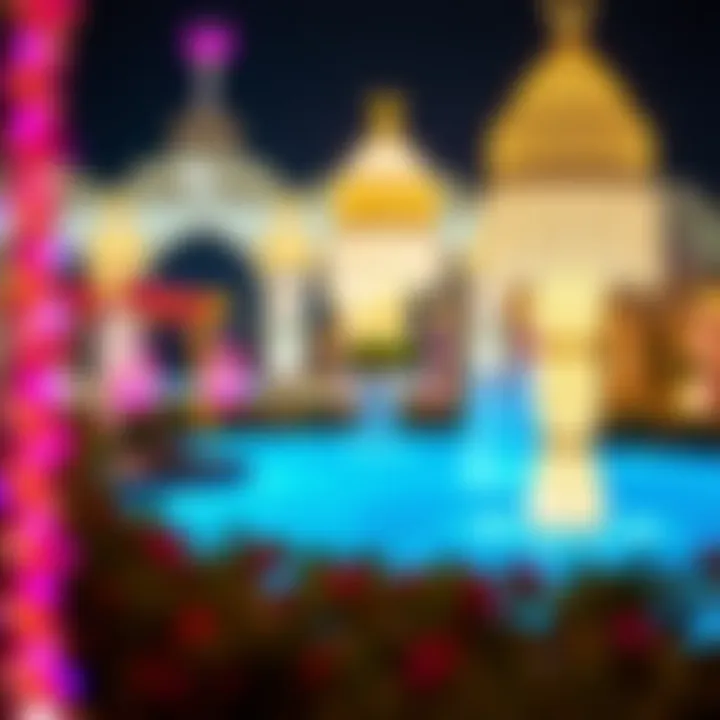
Intro
Eid ul Fitr is not simply a celebration; it's a tapestry of emotions, traditions, and communal joys that resonate deeply within Dubai’s vibrant atmosphere. As we approach the year 2023, understanding the intricacies of this festival becomes essential for anyone keen on truly experiencing the spirit of Dubai. This guide aims to unravel the significance of Eid ul Fitr, addressing a myriad of aspects from holiday dates to investment opportunities in real estate.
In Dubai, Eid ul Fitr is an occasion marked by joy, reflecting the diverse tapestry of cultures that come together in this remarkable city. For expatriates, investors, and homebuyers alike, understanding the local customs, property market dynamics during this festive period, and leisure activities can enhance one’s experience during these holidays.
This section will lay the groundwork for a deeper exploration of how Eid ul Fitr shapes lives in Dubai, through its rich cultural significance and burgeoning market trends.
Overview of Eid ul Fitr
Eid ul Fitr marks the culmination of Ramadan, the holy month of fasting for Muslims. It is a time of joy, gratitude, and reflection, setting the stage for community gatherings and the reaffirmation of faith. More than just a holiday, it encapsulates significant cultural values and fosters a sense of belonging among followers. In the dynamic city of Dubai, these celebrations take on a unique flair, intertwining traditional customs with modern extravagance.
Historical Background
The roots of Eid ul Fitr trace back to the time of Prophet Muhammad, who emphasized the importance of charity after fasting. This festival is observed on the first day of Shawwal, after the month of Ramadan, when Muslims are commanded to give Zakat al-Fitr, a form of almsgiving that seeks to purify those who fast from any indecent act or speech. It was during these early years of Islam that the festival was instituted, symbolizing the communal spirit and the significance of shared blessings. Over the centuries, these practices have extended beyond simple observance, evolving into expansive celebrations embracing food, prayers, and joyful gatherings.
To this day, the essence of Eid ul Fitr is mirrored in the historical accounts of how the festival has been celebrated differently across various cultures. Each community adds its flavor and touches, often resulting in unique traditions that showcase local customs.
Cultural Significance
Eid ul Fitr serves multiple purposes beyond personal and spiritual reflections. For many, it holds deep cultural significance as a time when families come together, strengthen bonds, and enjoy the warmth of community. In Dubai, where diversity reigns, various nationalities celebrate Eid, blending their customs into a rich tapestry of festivities.
The act of giving is a crucial component of Eid celebrations. As families gather to share traditional dishes like biryani or kunafa, it’s customary for individuals to offer their blessings in the form of charity, solidifying community ties and promoting goodwill. This spirit of generosity extends long after the festival concludes, as many look to support local charities and organizations.
Moreover, the joy of Eid ul Fitr transcends the spiritual realm and integrates into the social fabric. Beyond the prayers and feasting, public spaces in Dubai transform to host events, markets, and festivals, inviting everyone to partake in the celebrations. Such practices not only cultivate a sense of unity but also enhance the vibrant character of Dubai’s cultural landscape.
In a world that is often busy and fast-paced, Eid ul Fitr offers an opportunity to pause and celebrate togetherness, shared beliefs, and cultural heritage. Understanding this significance allows investors, homebuyers, and expatriates in Dubai to appreciate the pulse of the community better and the underlying values that drive the real estate market during this festive period.
Eid ul Fitr Dates for
The calendar for Eid ul Fitr in 2023 holds significant weight, especially for those in Dubai where cultural festivities and family gatherings are at the forefront. Understanding the exact dates is crucial, not just for planning celebrations, but also for aligning activities with the public holiday schedule. It allows homes to be filled with joy and prepares the local markets and believers for the rituals that follow the holy month of Ramadan.
Eid Celebrations Timeline
Eid ul Fitr marks the end of Ramadan, the holy month of fasting, and traditionally falls on the first day of Shawwal, the tenth month of the Islamic lunar calendar. In 2023, Eid ul Fitr is expected to be observed on April 21, though the exact day may vary, depending on the sighting of the moon. This unpredictability adds an element of excitement.
The celebrations begin with the special prayer service at local mosques, followed by community feasts and the giving of alms, known as Zakat al-Fitr. Here’s a general timeline of events surrounding Eid in Dubai:
- April 20, 2023 (Evening): The sighting of the moon is anticipated, which will confirm Eid ul Fitr.
- April 21, 2023 (Morning): Eid prayers commence, typically held in large congregations to accommodate the crowds.
- April 21-23, 2023: Festive activities including family gatherings, communal breakfasts, and charity events take place.
This timeline sets the stage for festivities that blend solemnity with jubilation. Families come together to recognize the significance of the holiday, which reaffirms ties of kinship and community.
Public Holidays in Dubai
For residents and expatriates in Dubai, knowing the public holiday schedule is vital for organizing travel and leisure plans. It not only influences day-to-day activities but also affects various sectors, including tourism and retail.
In 2023, the public holidays related to Eid ul Fitr are expected to be as follows:
- Public Holiday: April 20-23, 2023. This includes the day of Eid and may extend further based on government announcements.
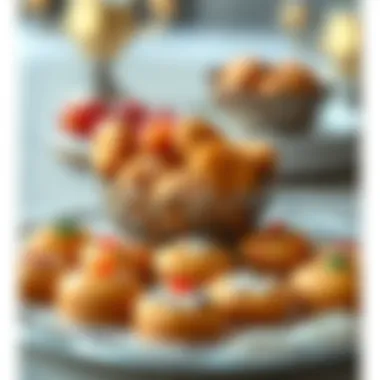
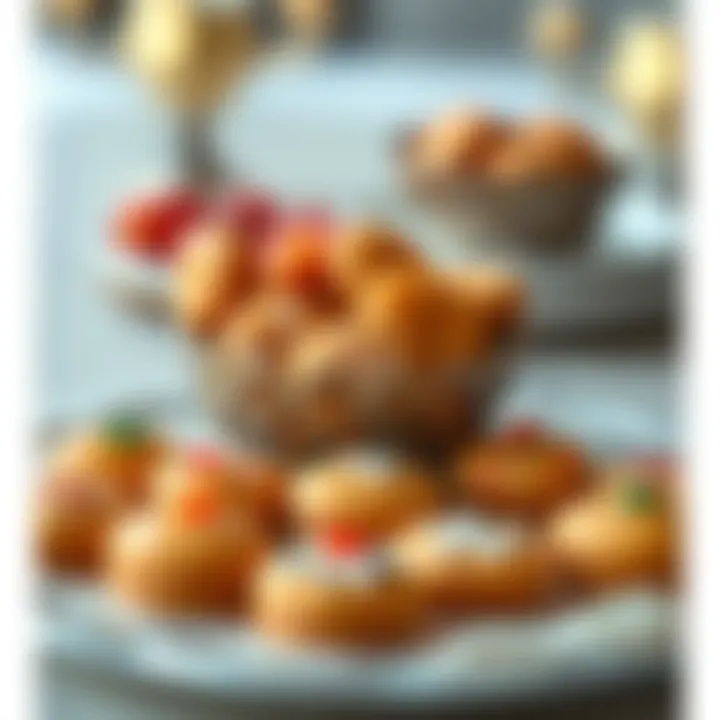
These holiday dates mean that schools and offices will be closed, granting everyone an opportunity to join in the celebrations. Many businesses, particularly in retail and hospitality, see a surge in activity during this time, as both locals and visitors seek to enjoy the festivities.
To effectively plan your Eid celebrations or gather insights into market dynamics, keeping track of the public holiday dates is crucial. Those looking to invest or explore property options can use this time to delve into potential opportunities that may arise during the increase in consumer activity — something every investor should consider.
"Knowing the dates allows families to plan ahead, ensuring that no one is left out of the festivities."
Celebration Practices in Dubai
Eid ul Fitr in Dubai is not just a holiday; it's a mosaic of traditions, customs, and celebrations that resonate with families, friends, and communities. As it wraps up the month of Ramadan, a time devoted to fasting and reflection, Eid ushers in joyous times laden with spiritual significance. Understanding the local practices can help newcomers and expatriates immerse themselves in the experience, making it a lively and memorable occasion. Each aspect reflects the vibrant fusion of cultural heritage and modernity that Dubai embodies.
Traditional Customs
During Eid, traditional customs take center stage. One of the most important is the Eid prayer, held in mosques and open spaces across the city. People gather early morning, dressed in their best attire, as a symbol of respect and gratitude. The atmosphere is filled with joyous exchanges of greetings like "Eid Mubarak!" which means "Blessed Eid!" Families come together, emphasizing the values of unity and compassion.
Beyond prayers, another time-honored practice is the act of giving Zakat al-Fitr, a form of charity given before the Eid prayer. This ensures that all community members can partake in the celebrations. This tradition not only uplifts those in need but also reinforces the community's bond.
As families come together, social visits become frequent. It’s common to see people visiting their relatives, sharing stories, and celebrating together. Many also choose to give gifts and sweets, which exemplifies the spirit of giving that’s essential during this festive period.
Festive Events and Activities
The magic of Eid truly blossoms through the numerous events and activities that take place throughout Dubai. From Grand celebrations at the Dubai Mall to spectacular shows at Global Village, each event showcases local and regional talent, drawing crowds of both locals and tourists.
One can experience cultural performances, art exhibitions, and children's activities that highlight the community spirit. For instance, many families gather to watch fireworks lighting up the night sky at Dubai Festival City; the spectacle is carefully choreographed, often in sync with music.
In addition, many hotels and resorts offer special Eid brunches and events, providing an excellent opportunity for families to enjoy leisure time together. These brunches often feature local delicacies alongside international cuisine, catering to a diverse palate.
Culinary Delights
Culinary offerings during Eid ul Fitr are simply mouth-watering. The holiday is an opportunity for families to indulge in lavish feasts, showcasing a variety of traditional dishes. Harees, a dish made from wheat and meat, is extremely popular. Another favorite is Mandi, which consists of spiced rice and slow-cooked meat that is a feast for the senses.
Then there are the sweets that no celebration can do without. Locally made baklava and maamoul, exquisite pastries filled with dates or nuts, embody the richness of Arabian flavors. Many families invite loved ones to enjoy these delicacies, underscoring the essence of sharing and hospitality.
As the holiday unfolds, it's common to see young children excitedly visiting family and friends, often trading sweets or picking up new recipes from one another. Meals during this festive time extend into the evening, creating an atmosphere filled with laughter, chatter, and the delightful sound of cutlery clinking against beautifully arranged plates.
"Eid ul Fitr in Dubai is a true celebration of unity and joy, bridging generations and cultures through beloved customs and shared experiences."
Travel and Vacation Ideas during Eid
Eid ul Fitr in Dubai presents a golden opportunity for both residents and visitors to immerse themselves in the festive spirit while exploring the rich cultural fabric of the city. The significance of travel and vacation ideas during this holiday period is multifaceted. It offers a chance to experience the grandeur of Dubai, as the city transforms into a vibrant hub, brimming with events, gatherings, and activities that reflect the local customs and international influences.
When planning excursions, it's essential to consider the diverse attractions that cater to all interests, from stunning landmarks to serene parks. Not only does this help travelers make the most of their time away from home, it also provides significant insights into the cultural landscape of the region.
Top Attractions to Visit
During Eid, a plethora of attractions beckons both tourists and locals.
- Burj Khalifa: Standing tall as the world's tallest building, a visit to this iconic structure is a must. The observation deck offers breathtaking panoramic views of the city, especially beautiful during the evening light.
- Dubai Mall: More than just a shopping destination, the mall houses an indoor aquarium, an ice rink, and countless dining establishments. During Eid, the mall often features special events and activities, making it an ideal stop for families.
- Dubai Marina: Strolling along the Marina Walk provides a picturesque setting, especially during sunset. Dining options along the waterfront give visitors a chance to savor delightful meals against a stunning backdrop.
- Global Village: This seasonal attraction showcases cultures from around the globe. Celebrating Eid here can be quite a joyous experience, with various events, authentic food stalls, and entertainment.
Many of these destinations often host special programs during Eid, enhancing their allure and giving visitors unique experiences.
Leisure Activities
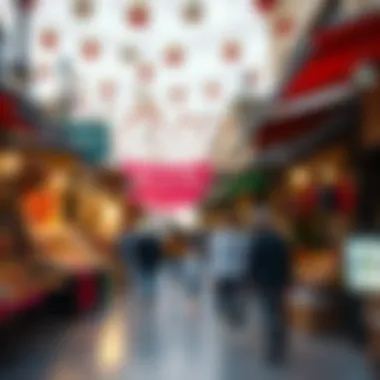
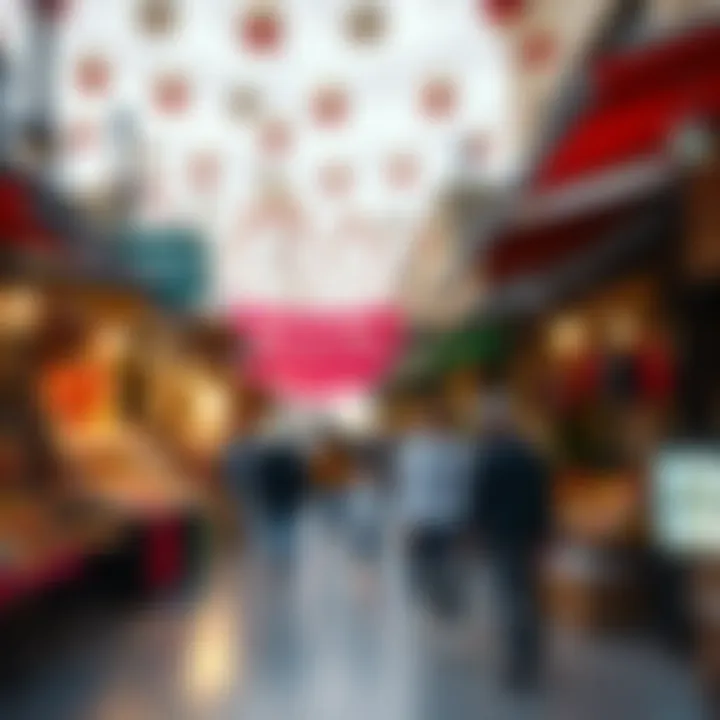
Eid is not just about feast and festivity; it offers numerous leisure activities that cater to everyone.
- Desert Safari: For those seeking adventure, engaging in a desert safari is an exhilarating experience. Visitors can partake in dune bashing, camel rides, and traditional Bedouin-style dinners under the stars.
- Cultural Tours: Exploring the historical sites like Al Fahidi Historical Neighborhood provides insight into Dubai's past. Guided tours often share stories that enrich the visitor's understanding of Emirati culture.
- Spa Retreats: Taking time out to pamper oneself at one of Dubai’s luxurious spas is quite popular during Eid. Many establishments offer special packages, allowing guests to unwind and relax.
- Water Parks: For families, spending a day at water parks such as Aquaventure or Wild Wadi can be a delight, providing fun for all ages.
Eid is a time to connect, explore, and broaden one's horizons. Whether venturing to famed landmarks, embracing the thrill of leisure activities, or indulging in fine dining, the experiences available during this festive period in Dubai are indeed diverse and enriching.
Real Estate Market Insights during Eid
The festive occasion of Eid ul Fitr notably influences the real estate market in Dubai. As this holiday encourages spending and investments, understanding its impact is crucial for investors, homebuyers, and expatriates aiming to navigate this dynamic landscape. With various users in mind, the insights presented in this section provide a framework for making informed decisions during this festive period.
During Eid, there is often an uptick in property viewings and transactions, driven by both the influx of tourists and the leisure time of local residents. This surge can create unique opportunities for both buyers and sellers.
Market Trends Analysis
The real estate sector tends to experience seasonal fluctuations in Dubai, with Eid being a pivotal point. Property values often see a slight increase due to heightened demand. Families and expatriates often prefer to make real estate decisions during this period, capitalizing on their time off to explore new living options.
Some key points to note include:
- Increased Interest from Expatriates: Many expatriates use this holiday to scout potential rental or purchase opportunities. Their presence can boost demand in specific neighborhoods.
- Temporary Suspension of Regulatory Processes: With many government offices closed for the holiday, some transactions may be delayed, making it important for buyers to plan ahead.
- Promotional Offers and Discounts: Various developers often unveil special Eid offers, enticing buyers with reduced prices or enhanced payment plans.
Eid also marks a period when developers often ramp up marketing initiatives, aiming to attract both local and international buyers. Writers or agents might consider leveraging this marketing push for their listings by showcasing properties in line with cultural festivities or community activities.
Investment Opportunities
Investing during the Eid period comes with numerous advantages. From emerging neighborhoods experiencing growth to popular areas witnessing rapid transactions, potential investors face diverse choices.
- Emerging Areas: Neighborhoods like Dubai Hills Estate and Dubai Creek Harbor are gaining traction, making them ripe for investment. Their infrastructure development combined with community-oriented amenities appeals to families and professionals alike.
- Luxury Developments: High-end properties generally see premium buyers during this season, as expatriates may look for prestigious locations to establish a residence. Engaging with high-net-worth clients could yield fruitful opportunities.
- Rental Properties: There may be an upsurge in short-term rental demand as visitors flock to the city for celebrations. Investing in properties suited for short-term leasing during Eid can yield significant returns, especially in vacation hotspots.
For those eyeing to invest, it's advisable to engage with local real estate agents who understand the unique Arabic market dynamics and can provide tailored advice.
"Understanding market behavior during festive times like Eid is key to capitalizing on lucrative real estate opportunities."
Moreover, prospective investors should familiarize themselves with the local legal framework governing property ownership, especially given that laws might have temporary adaptations during the holiday. This ensures a smoother transaction experience.
In summary, the Eid period not only acts as a catalyst for increased activity in the real estate market but also provides a unique backdrop for strategic investment. The festive atmosphere cultivates a sense of optimism and opportunity, making it a compelling time for engaging with Dubai’s diverse real estate offerings.
Legal Considerations for Investors
Investing in Dubai’s booming real estate market comes with its own set of rules and regulations, especially during celebrated occasions like Eid ul Fitr. Understanding the legal landscape is crucial for prospective investors who want to navigate the property ownership requirements efficiently. Ignorance can lead to complications, so gaining a grasp of local laws becomes an essential first step.
Understanding Property Laws
Dubai’s property laws are unique and multifaceted. The emirate has made significant strides to encourage foreign investment, but this also means that investors should be aware of the particulars that govern property ownership.
- Freehold vs. Leasehold: Investors in Dubai often encounter the terms "freehold" and "leasehold." Freehold properties allow full ownership of the land and property, while leasehold offers control for a defined duration, typically 99 years. Familiarity with these terms is vital, as it influences long-term investment decisions.
- Ownership Eligibility: Not every property is available to all nationalities. It's imperative to understand which areas are open for foreign investors. Certain developments, typically those built in designated freehold areas, permit foreign individuals and entities to buy without restrictions.
- Registration Processes: Once you have found a property, it’s not just a handshake and a deal. The Dubai Land Department mandates that properties be officially registered. This step usually involves fees and specific documentation, such as a No Objection Certificate (NOC) from the developer. Being organized can save you both time and money.
- Financing and Mortgages: Investors may look into financing options. Mortgage laws can have various stipulations, especially for non-residents. Understanding the parameters of loan approval is essential as it can differ greatly from other countries.
- Property Taxes and Fees: While Dubai has no property tax, associated fees such as registration fees, service charges, and yearly maintenance should not be overlooked. Budgeting for these can provide a clearer picture of your financial commitment.
Regulatory Framework during Holidays
As the festive atmosphere envelops the city during Eid ul Fitr, understanding the regulatory framework that operates during this time can additionally shape an investor's strategy. While many businesses might slow down or halt during the holidays, laws remain in effect, and opportunities abound.
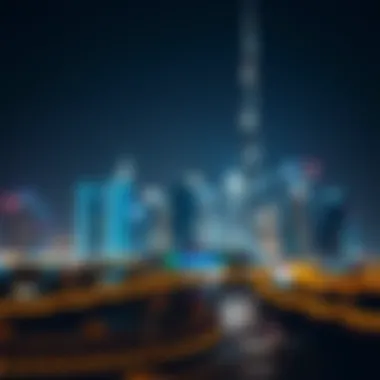

- Operational Hours: Be aware that government offices and real estate institutions may operate on reduced hours. Planning ahead is beneficial to ensure all legal matters are addressed without long delays.
- Contractual Agreements: It's advisable to avoid signing contracts during holiday periods unless absolutely necessary. The traditional practices of Eid call for festivities and family gatherings, which can sometimes lead to miscommunication or neglected details.
- Investment Opportunities: Many developers seize the Eid period to roll out new projects. This could mean promotional offers for investors. Keep your eyes peeled for announcements from major real estate firms, as these can provide favorable conditions.
"With careful planning and a solid understanding of property laws, investors can capitalize on the unique opportunities that emerge during festive seasons like Eid."
Navigating the legal landscape in Dubai may seem daunting, especially for those unacquainted with the local context. Yet, with the right knowledge and strategy, one can make informed decisions that lead to fruitful investments, ensuring that the spirit of Eid ul Fitr can also be met with lasting economic success.
Expatriate Experience during Eid
Eid ul Fitr holds significant meaning for expatriates living in Dubai, a city that thrives on its multi-cultural fabric. As a time of unity, the festival enables expatriates to feel a sense of belonging while immersed in the local culture. Their experiences during Eid are not just personal but are woven into the broader social tapestry of the community. Celebrating Eid is about embracing new customs and enhancing relationships with colleagues and neighbors.
The importance of the expatriate experience during Eid can be summed up in a few specific elements. First and foremost, understanding cultural integration brings expatriates closer to their host country. During this festive time, many expatriates are eager to learn about new traditions and partake in celebratory activities, fostering an authentic connection with the local populace.
Moreover, participating in holiday activities offers multiple benefits:
- Building Networks: Engaging in festivities gives expatriates the chance to interact with locals and other expatriates, creating bonds that can lead to lifelong friendships.
- Learning and Respect: By immersing themselves in the customs of Eid, expatriates not only show respect but also gain a deeper appreciation for the culture they are part of.
- Shared Joy: Being part of a collective celebration brings joy and a sense of community, even for those far from their homeland.
Adapting to cultural traditions during Eid is essential for expatriates. Attending prayer services, participating in charitable contributions, or simply sharing meals with neighbors can transform the experience from passive observation to active participation, solidifying their connection to Dubai. This immersion serves as a reminder that the essence of Eid transcends borders and cultures, making it a celebration that resonates universally.
"The beauty of Eid lies not just in the rituals we uphold but in the connections we forge with those around us."
Cultural Integration
Cultural integration during Eid for expatriates is not just about understanding rituals; it's also about embracing the spirit of the occasion. Many communities organize events that showcase local traditions, allowing expatriates a glimpse into how Eid is celebrated across different Muslim cultures. These gatherings often involve music, dance, and art, creating an engaging environment where everyone can participate.
Many expatriates also take this time to decorate their homes with lights and ornaments, reinforcing their involvement in the festivities. Such actions bring a slice of home while simultaneously showcasing respect for the local customs. This integration serves as a two-way street, with expatriates both sharing their cultural backgrounds and learning from others.
Community Gatherings and Events
Expatriate communities in Dubai often organize vibrant gatherings during Eid, turning ordinary parks and community centers into lively festivities. From food fairs presenting delicacies from various countries to children's activities that allow families to enjoy the occasion together, these events stand as a testament to unity in diversity.
Popular activities include:
- Cultural Shows: Live performances featuring traditional dances or music from different cultures represent a key highlight of many expatriate gatherings.
- Family-Friendly Events: Carnival-like atmospheres with games, petting zoos, and even bounce houses provide families an opportunity to bring joy to their children while experiencing the spirit of Eid.
- Charity Drives: A hallmark of Eid is philanthropy. Many expatriates join forces during this time to organize charitable initiatives to give back to the local community, reinforcing their commitment to Dubai and its residents.
With such rich offerings, the Eid experience for expatriates becomes one of not just celebration, but of connection, understanding, and generosity. This not only enriches their time in Dubai but also stands as a reminder to future generations about the values of empathy and community.
End and Future Outlook
Reflecting on the significance of Eid ul Fitr in Dubai offers not just a glimpse into a vital cultural celebration but also highlights its relevance in shaping future investment trends within the city. This spiritually charged festival stands as a bridge connecting the past and the future, allowing expatriates, locals, and investors to engage in a shared experience that transcends cultural boundaries. Observing the public observances and personal festivities, one can appreciate how these traditions serve as a foundation for community and growth.
As expatriates and residents alike come together to break bread and partake in the communal joy, there lies an underlying opportunity for investors. The festivities bring attention to areas rich with cultural heritage, opening doors for those keen on real estate investments. Unique neighborhoods that come alive with celebrations can frequently become hot spots for property development. With numerous families seeking homes rich in social connectivity and cultural vitality, it's evident that the local market remains buoyant during this holiday period.
Reflections on Eid ul Fitr
The essence of Eid ul Fitr is found in its ability to foster community, improve social cohesion, and imbue a sense of belonging amid the rapid modernization in Dubai. The festival itself serves as a reminder of the values of gratitude, generosity, and unity. During this time, it’s more than just the rituals; it’s about turning strangers into friends and fostering bonds that make the expat experience worthwhile.
In many ways, the celebrations provide a cultural immersion that can enhance the expatriate lifestyle. Special gatherings, festivals, and food markets facilitate a deeper understanding of the local customs, thus creating an environment where cross-cultural appreciation can flourish. As residents reflect on these themes, they find personal growth aligned with the community's development and prosperity. The communal prayers and festive meals signify not only the end of fasting but also the importance of reiterating social ties.
Anticipating Real Estate Developments
Looking ahead, the aftermath of Eid ul Fitr presents ripe opportunities for real estate developments in Dubai. The holiday period often paves the way for strategic announcements and new projects aimed at aligning with the festive energy imbibed in the community. Investors should keep a close watch for trends such as:
- Emerging neighborhoods: Areas that witness a surge of visitors and families during Eid often see increased interest in housing.
- Lifestyle-centric projects: As families value community-centric amenities, projects that cater to this trend stand to gain momentum.
- Sustainable developments: Modern investors are leaning toward sustainability, aligning projects with environmental consciousness to attract discerning buyers.
It is essential to note that while the festive period brings short-term growth, potential property investors must look long-term. Analysis of market expansions post-Eid may reveal shifts in buyer preferences, influenced by seasonal changes and cultural motivations. The festival’s end doesn't signify the end of opportunity; instead, it marks the opening of a series of possibilities for astute investors to capitalize on the vibrant culture woven into Dubai’s rapidly evolving real estate landscape.
In summary, reflecting on the cultural motives and anticipating market trends provides a comprehensive understanding of the implications surrounding Eid ul Fitr in Dubai. Investors with a keen eye on these nuances stand to reap benefits that extend beyond typical holidays, tapping into the underlying currents of community resilience and social value.



